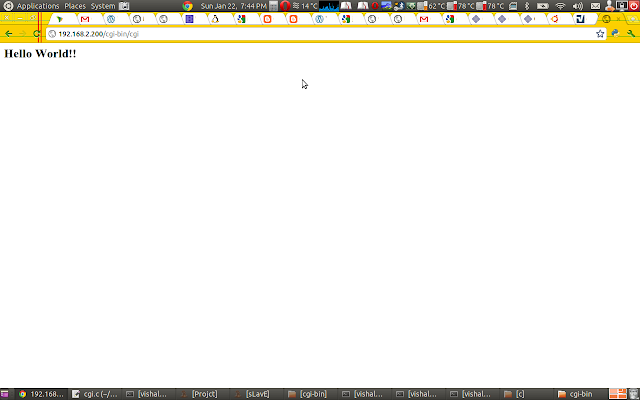Configure Your Apache2 For CGI
First question that comes to Our mind is "what is CGI??"
Ans:The Common Gateway Interface (CGI) is a standard method for web server software to delegate the generation of web pages to executable files. Such files are known as CGI scripts; they are programs, often stand-alone applications, usually written in a scripting language.
A web server that supports CGI can be configured to interpret a URL that it serves as a reference to CGI scripts. A common convention is to have a cgi-bin/ directory at the base of the directory tree and treat all executable files within it as CGI scripts. Another popular convention is to use filename extensions; for instance, if CGI scripts are consistently given the extension .cgi, the web server can be configured to interpret all such files as CGI scripts
I think thats enough of definition now come to implementation part.
So First we need to configure apache to make CGI works...So here it goes
Create a /var/www/cgi-bin/:
Code:
mkdir -p /var/www/cgi-bin/
Open httpd.conf
Code:
vi httpd.conf
Append following code:
Code:
<IfModule mod_alias.c>
ScriptAlias /cgi-bin/ /var/www/cgi-bin/
<Directory /var/www/cgi-bin/>
AllowOverride None
Options ExecCGI -MultiViews +SymLinksIfOwnerMatch
Order allow,deny
Allow from all
</Directory>
</IfModule>
Restart apache.
Now we make a simple C hello world program and put the compiled binary of that program in our cgi-bin folder.
#include<stdio.h>
main()
{
printf("Content-type:text/html\n\n");
printf("<h2>Hello World!!</h2>");
}
compile above program {let program name is cgi.c}
gcc -o cgi cgi.c
Now copy the cgi(output binary of above program) file to /var/www/cgi-bin folder
Now Open Up your Browser and put url in address bar and thats it ...
First question that comes to Our mind is "what is CGI??"
Ans:The Common Gateway Interface (CGI) is a standard method for web server software to delegate the generation of web pages to executable files. Such files are known as CGI scripts; they are programs, often stand-alone applications, usually written in a scripting language.
A web server that supports CGI can be configured to interpret a URL that it serves as a reference to CGI scripts. A common convention is to have a cgi-bin/ directory at the base of the directory tree and treat all executable files within it as CGI scripts. Another popular convention is to use filename extensions; for instance, if CGI scripts are consistently given the extension .cgi, the web server can be configured to interpret all such files as CGI scripts
I think thats enough of definition now come to implementation part.
So First we need to configure apache to make CGI works...So here it goes
Create a /var/www/cgi-bin/:
Code:
mkdir -p /var/www/cgi-bin/
Open httpd.conf
Code:
vi httpd.conf
Append following code:
Code:
<IfModule mod_alias.c>
ScriptAlias /cgi-bin/ /var/www/cgi-bin/
<Directory /var/www/cgi-bin/>
AllowOverride None
Options ExecCGI -MultiViews +SymLinksIfOwnerMatch
Order allow,deny
Allow from all
</Directory>
</IfModule>
Restart apache.
Now we make a simple C hello world program and put the compiled binary of that program in our cgi-bin folder.
#include<stdio.h>
main()
{
printf("Content-type:text/html\n\n");
printf("<h2>Hello World!!</h2>");
}
compile above program {let program name is cgi.c}
gcc -o cgi cgi.c
Now copy the cgi(output binary of above program) file to /var/www/cgi-bin folder
Now Open Up your Browser and put url in address bar and thats it ...





No comments:
Post a Comment